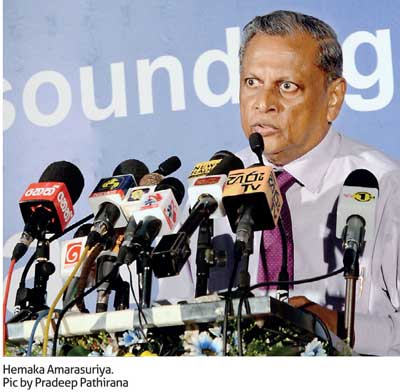Reply To:
Name - Reply Comment
By Chandeepa Wettasinghe
The country’s largest insurance provider, the state-owned Sri Lanka Insurance Corporation (SLIC), will be looking to consolidate on its core strengths over the coming two years, after delivering a strong performance for 2015, the SLIC Chairman said.
“At the moment for the next 2 years, yes,” Hemaka Amarasuriya said in response to a question by MirrorBusiness whether the insurance giant will focus on consolidating its recent expansions, on the sidelines of an event to celebrate SLIC’s recent triumphs. He said that the involvement of veteran private sector individuals at the top level has helped increase efficiencies and profitability, and SLIC will focus on digitalizing its back-end operations through SAP (Systems, Applications and Product) and other technologies.
“I hope that more in the private sector leave their riches and come to improve the public sector,” he added.
However, he added that SLIC will still attempt to ride on the growth momentum it had built up over 2015.
The year saw SLIC’s gross written premium increasing to Rs.24.5 billion from Rs.20.6 billion year-on-year (yoy) with the life insurance fund increasing to Rs.77 billion from Rs.74 billion yoy and the general insurance fund increasing to Rs.15 billion from Rs.13 billion yoy.
The country’s life insurance penetration increased to 12 percent according to SLIC, compared to 11.3 percent yoy according to Central Bank data, while SLIC’s market share in life insurance stood at 23 percent, and general insurance stood at 21 percent.
This leap may have been due to cash hand-outs given by the government to the state-sector employees, and the additional disposable income created due to deflationary pressures from subsidies in the 2015 budget.
However, Amarasuriya is still disappointed over the country’s current insurance landscape. “We have to educate people on the importance of insurance. 12 percent is very low. What I think is that as the economy develops, there will be more money, and there will be a realization of the importance of insurance,” Amarasuriya said.
The country’s gross domestic product grew just 4.8 percent in 2015, compared to 4.9 percent in 2014, while projections for 2016 are now 5 percent, down from initial projections of 5.8-6 percent earlier this year. Meanwhile, Amarasuriya noted that SLIC will continue to channel its profits into the safety of government securities, and will be circumspect in overall asset management. “We won’t invest in shares a lot at the moment because we’re loaded with assets. We don’t want to be lopsided in asset management. We have Grand Hyatt, Litro Gas, Litro Terminals and 55 percent of Lanka Hospitals. We have to be careful,” he said.
SLIC is one of the main investment vehicles of the government, investing heavily in private banks in concert with the state-controlled pension funds and state banks in order to have the largest shareholding in them, since private parties are legally allowed to have only up to 15 percent ownerships in banks. While Amarasuriya noted that investments in banking shares will remain profitable due to the multiple interest rate hikes seen this year, he expressed some worry over the prospects of other corporate investments. Many Sri Lankan corporates have overextended themselves by borrowing heavily to invest in capital projects, and are now in precarious positions due to the rise in interest rates.
Amarasuriya said that SLIC will sell stocks if there will be a massive profit realization, but will be cautious of buying. “Shares, if we have an opportunity to make profits we will trade. If their profile is okay and if the stokebrokers recommend, we will buy. We mainly go for blue chips and banks. The banks have been safe through good risk management,” he added.